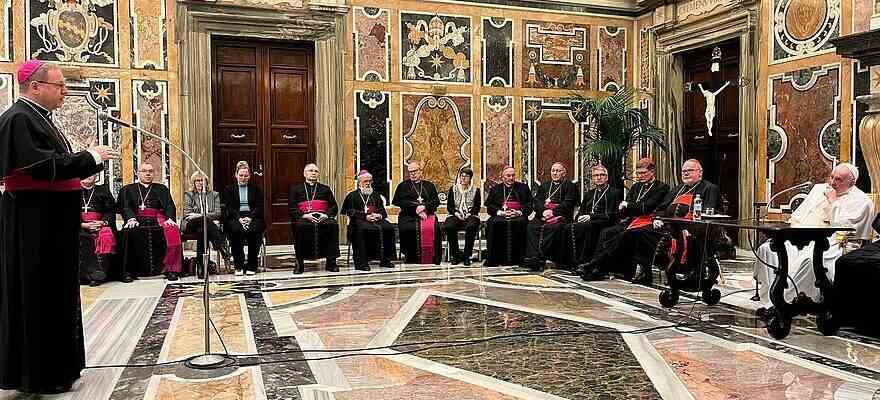It was close: The synodal path, the reform debate of the Catholic Church in Germany, was probably on the verge of being over. At a meeting lasting several hours between the German Catholic bishops and the heads of the curial authorities in the Vatican, a moratorium on the synodal path was discussed on Friday. This was announced by the German Bishops’ Conference and the Holy See. The requested freeze would probably have meant the end of the reform process.
But the German bishops were still able to avert this – and in retrospect it was probably even helpful that Pope Francis stayed away from the meeting on Friday. Even Georg Bätzing, chairman of the German Bishops’ Conference, described the situation as a “stroke of luck”. That way you could have open and controversial discussions.
Although the Pope had already spoken for two hours with the German bishops on Thursday, his attendance at the so-called interdicasterial meeting on Friday was still firmly expected. But then Francis simply did not show up, which initially caused irritation.
Ordination for women is a red line
“The Pope is a clever Jesuit. He once let us wrestle with each other as brothers,” said Bätzing on Saturday morning in Rome. It has been a busy week for the Bishop of Limburg and his German confreres. From Monday to Friday evening they were in the Vatican for the “Visitatio ad limina apostolorum”, the “visit to the doorsteps” of the apostles’ graves, which is mandatory every five years according to canon law, including reporting to the Curia on the situation of the Catholic Church in Germany. It was “challenging,” says Bätzing.
Because the synodal path is a thorn in the side of the curials, the Vatican fears for the unity of the church and a special path out of the country, which has already produced a schism in the church. The Swiss Curia Cardinal Kurt Koch recently went so far as to make a Nazi comparison, and Pope Francis is also extremely skeptical about the process. On the part of the Curia there were “clear announcements” that were taken seriously, said Bätzing.
One of the red lines that should not be crossed from the point of view of the heads of the curia is the question of the ordination of women to the priesthood. Demands for changes in celibacy or sex teaching are seen critically. There was no official statement from the Vatican on the “Synodal Council” planned in Germany, a permanent governing body between bishops and lay people – even if this is also viewed very skeptically in Rome.
In his speech to the heads of the Curia, Bätzing criticized the fact that lay people in Rome were still not being heard: “To be honest, I have to say that there are no key people and supporters of the synodal path in our country in this conversation. Because we bishops are part of a synodal assembly with 230 People – believers who are very committed to their church.” The laity made up the majority of the people of God, and there was great pressure on the Catholic base in Germany. “God’s people in Germany are impatient and are pushing for change,” said Bätzing.
He also criticized the fact that Francis made no reference to the abuse scandal in the Catholic Church in his “Letter to the pilgrim people of God in Germany,” which he published at the beginning of the Synodal Path.
This is the starting point for the synodal path and “all efforts towards evangelization will be of little use if radical honesty about mistakes and systemic deficiencies in our church do not first lead to conversion and renewal, consistently, structurally and right down to church practice and teaching looking,” said Bätzing. The previous structures in the Catholic Church had also led to abuse. “I’m amazed by the impression from some of the conversations over the past few days that not all of our conversation partners share this.”
It was also about Cardinal Woelki
During their visit, the German bishops also addressed the situation in the Archdiocese of Cologne, both to Pope Francis himself and to the Prefect of the Bishops’ Congregation, Marc Ouellet. It was made clear that the situation was becoming increasingly unbearable, including for Woelki himself, said Bätzing. Woelki was present at the meeting. The Pope’s attitude of not making decisions under pressure ultimately leads to even more pressure. However, the Pope did not say when and how he would decide on Woelki’s future.
Francis has had Woelki’s resignation request for some time, which he had asked the cardinal to write himself – as a result of an unprecedented crisis of confidence in the archdiocese because of Woelki’s handling of the abuse investigation. In the meantime, even the public prosecutor’s office is investigating against the archbishop, there is a suspicion that he should have given a false affidavit as to when he knew about allegations of abuse against a prominent priest.
Bätzing said he was still going home from Rome “with a certain relief”: “Because we have named topics and nobody can say that they had not heard anything about them or could not express themselves”. But he is also going “with a certain concern, because I cannot yet assess the dynamics of the synodal processes. But maybe this tension is good: relief and concern.”

